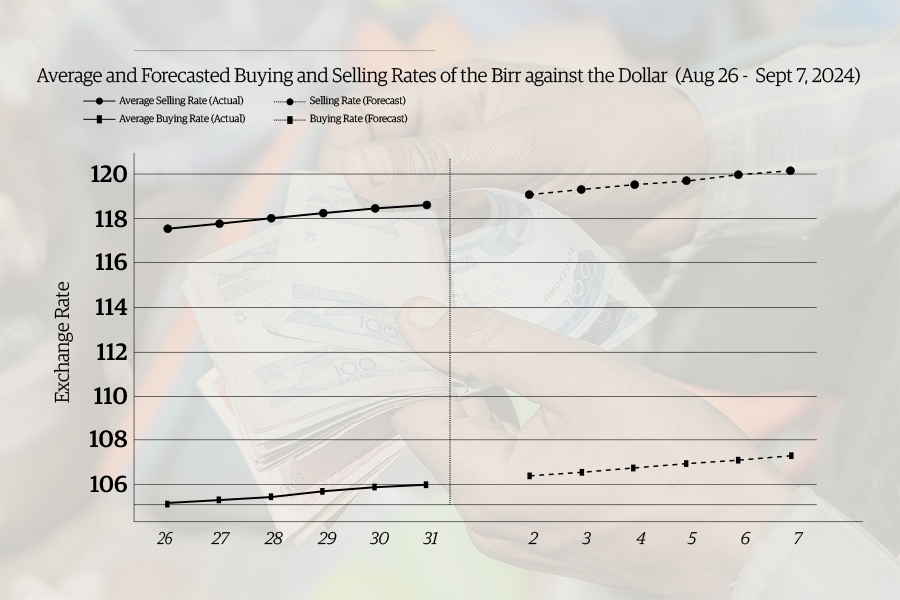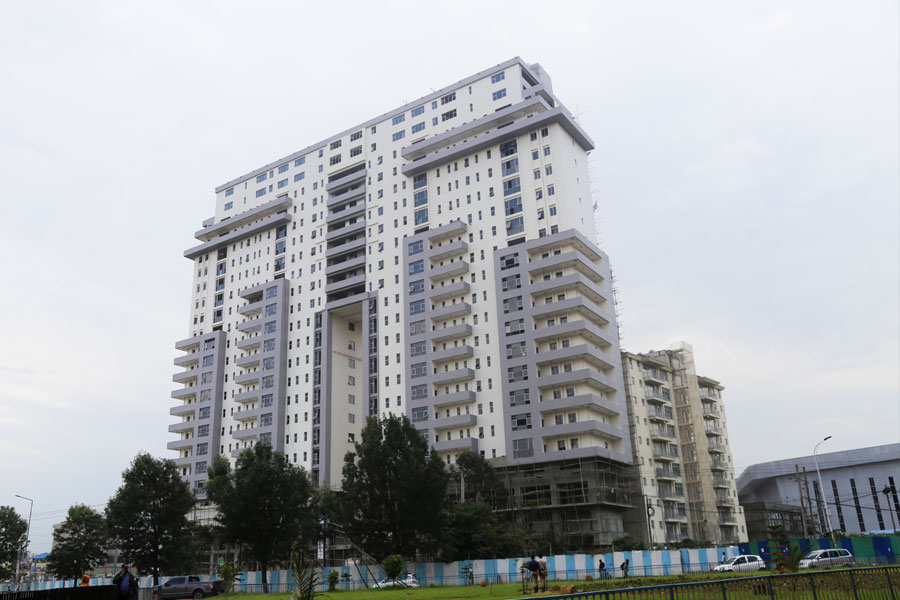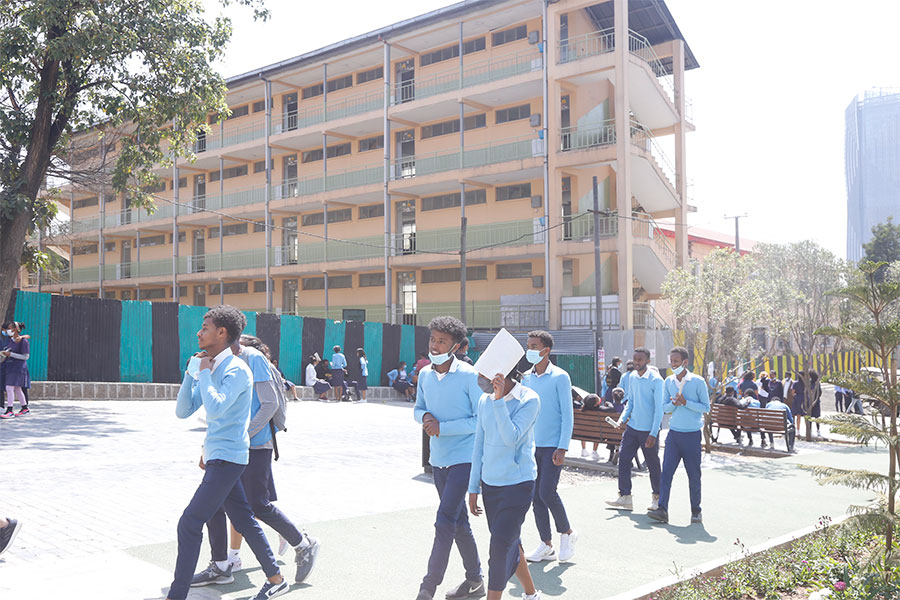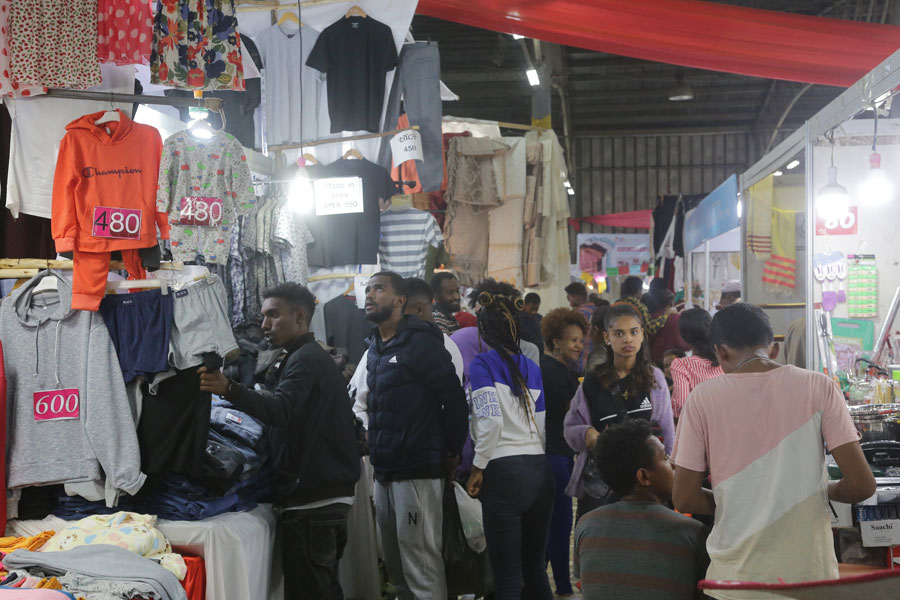
My Opinion | Apr 11,2020
The beginning of the school year has become a source of anxiety for parents such as Tsige Bedada, a 39-year-old single mother befuddled on how to pay for items her children need.
With her fluctuating income as a tailor that hovers around 3,000 Br, Tsige opted to enrol both her daughters in a public school unable to keep up with the ever-increasing school fees.
As the Addis Abeba City Administration has yet to meet its exercise book delivery quota for the year, Tsige has marched to the commercial heart of the city, Merkato, to purchase a pack instead of depending on the subsidised modality offered for public school students.
"This will get them going for the time being," she told Fortune.
Tsege has purchased a dozen exercise books for 650 Br, having tapped out her monthly income as she added two school bags.
"I've gone through my savings," she said.
The City Administration took up an initiative of providing school uniforms, meals and exercise books to students enrolled in public schools under the helm of former deputy mayor Takele Uma in a bid to minimise absenteeism and boost enrollment.
While the initiative has grown to an Agency in four years, including 20 feeding centres which provide two meals daily, distribute uniforms and exercise books and manage to obtain a budget of 3.2 billion Br, its efficiency has failed to ease the concerns of the parents.
Close to 700,000 students are expected to enrol on public schools this year; a 100,000 rise in the number which required procurement plans for exercise books to climb by a fifth. This year six million exercise books will be imported with a budget of around 200 million Br under the supervision of the Agency.
Menewer Ibrahim, deputy resource supply director, is confident it will be distributed before the end of the month, despite the school year starting mid-September. He insists that deliveries will be made on time without causing too many disruptions in the process.
A similar sentiment is echoed by the City's Education Bureau with the Plan & Budget Director, Getahun Lemma.
"Serious class won't begin in a week," he told Fortune.
Getahun attributed last year's late delivery to printing and forex issues, which he claims are now resolved. He indicated that the Bureau merely distributes to districts which then pass to children in public schools.
As parents await the City Administration to successfully bring in the exercise books, the Ministry of Trade & Regional Integration has teamed up with the Ethiopian Trading Businesses Corporation to disseminate 3.2 million pieces upto 55 Br price in the market.
Although the Corporation operates across the country through its seven outlets with lower prices than retailers who sell at around 65 Br, it is significantly higher than wholesalers' prices in Merkato which sell between 30 and 44 Br.
The Communication Head Etenesh Gebremichaels, said the price was set by the Ministry only to meet the supply gap.
"We're not adding a profit margin," she said.
Large-scale importers have cut down on the prices in anticipation of a market lull due to conflict in regional states and relatively better access to foreign currency this year.
Al Sam Corporation Ltd, an importer of several household brands like B-29 soap and BIC pen also bring into the country the famous Sinar Line exercise book.
Yehyes Alemayehu, deputy business head of the group, indicated that they have distributed the exercise books at 20 Br less price compared to last year due to early arrivals and excess supply in the market.
While the business powerhouse has walked back on its intention of installing an exercise book factory due to its high reliance on imported inputs, Alsam still manages to bring over 30 containers of Sinar Line and around 25 containers of BIC.
Meanwhile, local manufacturers like MAMCO, a subsidiary company of Midroc Investment Group, did not produce a single exercise book in the year despite an annual plant capacity of three million pieces.
According to Administrative Manager Abdela Ahmed, the combination of forex shortages and lack of demand from the market for their products are causing them to pile up on inventory with 400,000 pieces from last year in stock.
The company, which requires around five million dollars annually to meet its demand for inputs, has laid off 32 employees due to the lull in production. MAMCO has resorted to exporters for its forex needs despite the persistent lack of demand from the market due to the exercise books lacking a plastic cover.
According to UNICEF data, the combined impact of COVID-19, conflict, and climate change has contributed to at least 13 million children being out of school in Ethiopia, with long-term consequences for their future.
Vendors around Sidamo Tera area, complain of the sharp decline in sales. The place is a hotbed of school supply transactions in Merkato.
With a concentration of customers making their way from the conflict-ridden Amhara Regional State, sales for the wholesaler Yishak Gebrewold usually meant truck shipments to his customers in Weldiya, Gonder and Bahir Dar cities.
"We have not even had a chance to hear from them," he sorrowfully told Fortune while he sat on the roadside to fetch customers.
He only sells cartons of 192 pieces each. Although prices are down from his side, Yishak suspects that most have switched to bringing in food items like edible oil due to uncertainties about when school starts.
Despite the 10 Br drop in prices from last year at the shop, regular shoppers with relatively fuller wallets such as the mother of four Mekdes Mitiku barely noticed the difference after spending around 2,500 Br for a shopping list that included pens, pencils and drawing books.
"The load is easy to carry but heavy to spend on," she told Fortune in a humorous tone.
Yishak's contemplations about vendors in the conflict-ridden region cutting back on their purchases are reflected by the increased number of trucks hauling food items rather than educational commodities.
Engidaw Mulu, a stationery supplies vendor in Gonder City in Amhara Regional State, is shocked by the drop in prices after May due to increased imports.
While he acknowledges the contribution of instability in the area as the main culprit behind the dreary market, the absence of buyers for seasonal items like exercise books still surprised him.
"Parents usually flock to the market trying to get discounts at this time," he told Fortune.
Engidaw pointed to the decreased number of drivers making the journey to the regional state partly causing the market shock, while the drop in customers has pushed down the prices of pens, sharpeners, pencils and lunch boxes with no significant increases in sales.
The importers echo the sentiment as they have been selling at breakeven prices due to the mismatch in demand and supply. Haile Tenalem, who heads the 40-year-old family business with an eponymous name indicates that importers are selling out to prevent severe losses.
"Swift and small losses are better than belated profits," he said.
Tenalem Trading has only had six containers of school supplies delivered from an order of thirty, requiring a swift response before prices fall further. Their flagship product, "Gravity", a lesser-known exercise book brand, has dropped by 12 Br a piece while still managing to amass 500 cartons of unsold inventory from last year.
The other major concern for parents during the school year is transportation, which has unceremoniously climbed due to the increment in fuel costs.
The "Sheger" school buses overseen by the Addis Abeba City Bus Service Enterprise have been trying to alleviate the pressure for the past six years. However, the nearly threefold increase in prices this year has shaken up parents like Addis Kebede who has three school-age children using the public bus system.
The truck driver with an average monthly net income of around 50,000 Br said his 500 Br a month transportation cost per child has shot up to 1,250 Br.
This comes amidst a 70pc spike in school fees he had been adjusting to.
All his children go to Cruise School around the Bisrate Gebriel area, with the oldest being a 10 grader with two more years of schooling left. While Addis had chosen the school bus system for its lower price compared to private taxis, he said it costs 450 Br more to use public buses now.
"The increased margin is how much I used to pay last year," Addis told Fortune.
The Addis Abeba Bus Enterprise operates across 70 routes in the City with 100 school buses, which managed to serve 4,300 students hailing from 36 private and public schools in the year.
Addis and a few other parents had gone to the Enterprise to protest against the increase in fees with officials informing them that it would be looked into. He expressed being puzzled as to how people with a fixed salary manage to function in the current inflation rates.
"I'll cut back on savings and leisure," said the disgruntled father upon learning that the elevated fees will be maintained for the year.
Communication Head Samuel Fiseha wholeheartedly attributes the price hike to the increased fuel and maintenance costs. He explained that prices are calculated using the distance travelled as a yardstick, with the smallest fees for less than seven kilometres being 1,250 this year, a rise of 750 Br and the highest fees being 2450 Br for 27km, a rise of nearly 1,500 Br from last year.
Economists underscore the importance of a stable environment to enable proper forecasts for any sector, particularly education.
Atlaw Alemu (Prof), an economist and a lecturer at Addis Abeba University questions whether education officials really appreciate the role of timely and well-supplied materials in fostering efficient human capital.
He reasons that the country's overall unpredictability leads to sudden market shocks. He said the periodic and cyclic nature should make it predictable enough to successfully manage commodity purchases each year.
"The widespread exam failure rates should not be surprising," he told Fortune.
PUBLISHED ON
Sep 16,2023 [ VOL
24 , NO
1220]

My Opinion | Apr 11,2020

Covid-19 | Feb 27,2021

Money Market Watch | Sep 01,2024

Fortune News | Jun 10,2023

Editorial | Sep 23,2023

Agenda | Nov 13,2021

Commentaries | Aug 07,2021

Fortune News | Aug 17,2025

Viewpoints | Jan 01,2022

Featured | Jan 01,2023

Dec 22 , 2024 . By TIZITA SHEWAFERAW
Charged with transforming colossal state-owned enterprises into modern and competitiv...

Aug 18 , 2024 . By AKSAH ITALO
Although predictable Yonas Zerihun's job in the ride-hailing service is not immune to...

Jul 28 , 2024 . By TIZITA SHEWAFERAW
Unhabitual, perhaps too many, Samuel Gebreyohannes, 38, used to occasionally enjoy a couple of beers at breakfast. However, he recently swit...

Jul 13 , 2024 . By AKSAH ITALO
Investors who rely on tractors, trucks, and field vehicles for commuting, transporting commodities, and f...

Oct 4 , 2025
Eyob Tekalegn (PhD) had been in the Governor's chair for only weeks when, on Septembe...

Sep 27 , 2025
Four years into an experiment with “shock therapy” in education, the national moo...

Sep 20 , 2025
Getachew Reda's return to the national stage was always going to stir attention. Once...

Sep 13 , 2025
At its launch in Nairobi two years ago, the Africa Climate Summit was billed as the f...